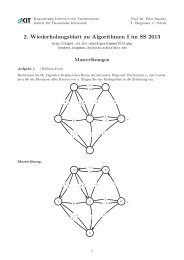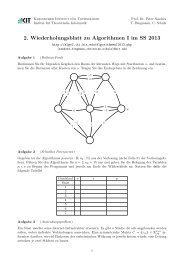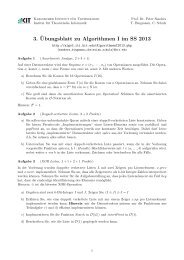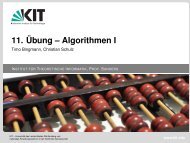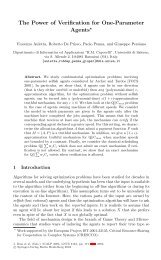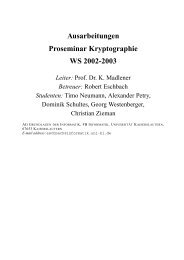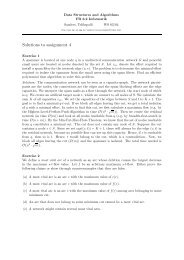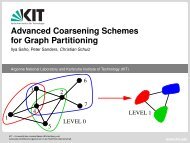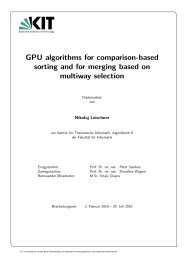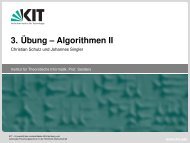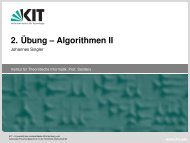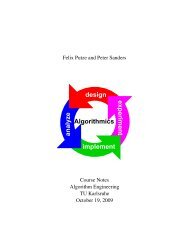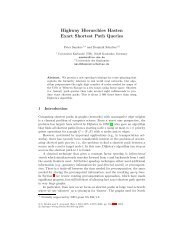Stxxl : Standard Template Library for XXL Data Sets - Max-Planck ...
Stxxl : Standard Template Library for XXL Data Sets - Max-Planck ...
Stxxl : Standard Template Library for XXL Data Sets - Max-Planck ...
Create successful ePaper yourself
Turn your PDF publications into a flip-book with our unique Google optimized e-Paper software.
strategy. <strong>Stxxl</strong> has implementations of LRU and random replacement strategies. The user<br />
can provide his/her own strategy as well. <strong>Stxxl</strong> vector has STL compatible Random Access<br />
Iterators. One random access costs O(1) I/Os in the worst case. Sequential scanning of the vector<br />
costs O(1/DB) amortized I/Os per vector element. In the paper we use the classical notation<br />
from [38], where M is the size of main memory, B is the block size in bytes, D is the number of<br />
disks, and N is the input size measured in bytes.<br />
The I/O-efficientstxxl::stack is perhaps the simplest external memory data structure. Four<br />
different implementations of stack are available in <strong>Stxxl</strong>. Some of the implementations are optimized<br />
to prefetch data ahead and to queue writing, efficiently overlapping I/O and computation.<br />
The amortized I/O complexity <strong>for</strong> push and pop stack operations is O(1/DB).<br />
External memory priority queues are the central data structures <strong>for</strong> many I/O-efficient graph<br />
algorithms [39, 9, 27]. The main technique in these algorithms is time-<strong>for</strong>ward processing [9, 3],<br />
easily realizable by an I/O efficient priority queue. I/O efficient priority queues also find their<br />
application in large-scale discrete event simulation and online sorting. The <strong>Stxxl</strong> implementation<br />
of priority queue is based on [31]. This queue needs less than a third of I/Os used by other<br />
similar cache (I/O) efficient priority queues (e.g. [7, 18]). The implementation supports parallel<br />
disks and overlaps I/O and computation.<br />
The current version of <strong>Stxxl</strong> also has an implementation of external memory map (based on<br />
B + -tree) and external memory FIFO queue.<br />
As in other external memory algorithm libraries [11, 22] <strong>Stxxl</strong> has the restriction that the<br />
data types stored in the containers can not have C/C++ pointers or references to other elements<br />
of external memory containers. The reason is that these pointers and references get<br />
invalidated when the blocks containing the elements they point/refer, are written to disk. To<br />
get around this problem, the links can be kept in the <strong>for</strong>m of external memory iterators (e.g.<br />
stxxl::vector::iterator). The iterators remain valid while storing to and loading from external<br />
memory. When dereferencing an external memory iterator, the pointed object is loaded from<br />
external memory by the library on demand (if the object is not already in the cache of the data<br />
structure).<br />
<strong>Stxxl</strong> containers differ in treating allocation and distinguishing between uninitialized and<br />
initialized memory from the STL containers. <strong>Stxxl</strong> containers assume that the data types they<br />
store are plain old data types (POD). The constructors and destructors of the contained data<br />
types are not called when a container changes its size. The support of constructors and destructors<br />
would imply significant I/O cost penalty, e.g. on the deallocation of a non-empty container, one<br />
has to load all contained objects and call their destructors. This restriction sounds more severe<br />
than it is, since external memory data structures can not cope with custom dynamic memory<br />
management anyway, the common use of custom constructors/destructors. However, we plan to<br />
implement special versions of <strong>Stxxl</strong> containers which will support not only PODs and handle<br />
construction/destruction appropriately.<br />
Algorithms<br />
The algorithms of STL can be divided into two groups by their memory access pattern: scanning<br />
algorithms and random access algorithms.<br />
Scanning algorithms. These are the algorithms that work with Input, Output, Forward,<br />
and Bidirectional iterators only. Since random access operations are not allowed with these<br />
kinds of iterators, the algorithms inherently exhibit strong spatial locality of reference. <strong>Stxxl</strong><br />
containers and their iterators are STL-compatible, there<strong>for</strong>e one can directly apply STL scanning<br />
algorithms to them, and they will run I/O-efficiently (see the use of std::generate and<br />
std::unique algorithms in the Listing 4). Scanning algorithms are the majority of the STL<br />
algorithms (62 out of 71). <strong>Stxxl</strong> also offers specialized implementations of some scanning algorithms<br />
(stxxl::<strong>for</strong> each, stxxl::generate, etc.), which per<strong>for</strong>m better in terms of constant<br />
8



